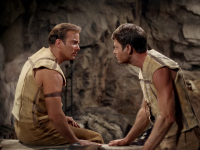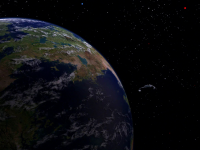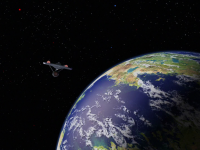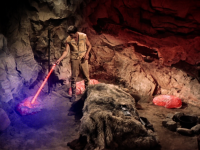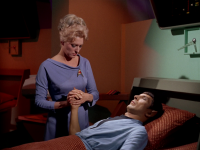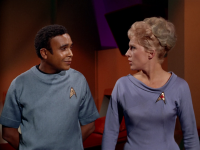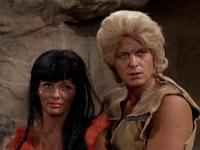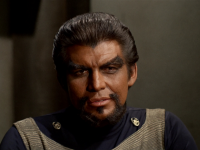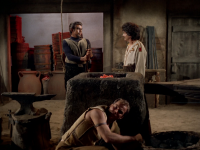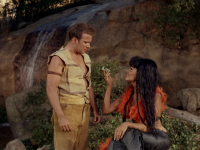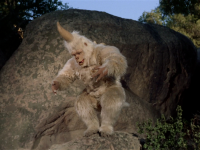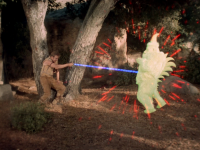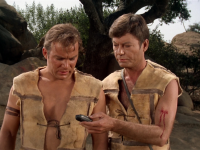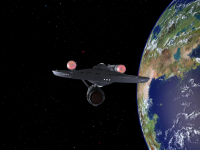Star Trek: The Original Series — 2x19 — A Private Little War
Synopsis
The Klingons provide arms to a peaceful planet and disrupt the balance of power.
Filler rating: good filler
Despite the apparent cliffhanger at the end of the episode, none of the events depicted here are ever followed up on. As such, this episode can be regarded as filler. However, it's a great story and well worth a viewing.
Remarkable scenes
- McCoy regarding Spock: "Lucky his heart is where his liver should be or he'd be dead right now."
- Kirk and McCoy attacked by a strange alien animal.
- Nurse Chapel holding Spock's hand, and then being informed that Spock probably knew she was doing that.
- Kirk: "We once were as you are. Spears and arrows. There came a time when our weapons grew faster than our wisdom and we almost destroyed ourselves. We learned from this to make a rule during all our travels never to cause the same to happen to other worlds, just as a man must grow in his own way and his own time."
- The revelation that the Klingons are feeding gradual technological improvements to the aliens in exchange for loyalty.
- Spock asking Nurse Chapel to hit Spock repeatedly and Scotty stopping her.
- McCoy debating the ethics of giving technology to more of the aliens with Kirk.
- Kirk fighting another one of those white-furred aliens.
- Nona stealing Kirk's phaser.
- Nona getting herself killed. What a moron.
- McCoy knelt over Nona's body watching in horror as Kirk and the hill people fight the villagers.
Review
Yet another proxy war episode featuring the Federation and the Klingon Empire manipulating a primitive planet as a power play in their their everlasting cosmic cold war. However unlike The Trouble With Tribbles and Friday's Child, neither of which very deeply explored the issue, and unlike Errand of Mercy whose exploration of the issue was cut short by interference from godlike aliens, A Private Little War is perhaps the most poignant exploration so far of the terrible impact a proxy war can have on the subjects of said manipulation.
Right from the beginning this episode is packed with great pacing and effective drama. Spock is badly wounded and there are Klingons in orbit! Kirk must focus on maneuvering the ship out of view of the enemy without knowing if his friend will live or die. As the episode moves forward, it makes it clear in no uncertain terms that it's a satire of conflicts like the Korean War and the Vietnam War, as a direct reference to such conflicts is made in the terrific ethical debate between Kirk and McCoy. The two characters wrestling with their morality is the centerpiece of the story, a rare treat afforded by the conspicuous but amusing incapacitation of Spock early on.
By taking Spock out of the picture at the beginning of the episode, the story was able to explore unusual character dynamics such as the oft-neglected plot thread involving Chapel's unrequited love for Spock while giving McCoy a chance to spend some quality time being Kirk's wingman in Spock's place for a change. McCoy's unique and highly emotive perspective on the issue served as a wonderful contrast to Spock's typically cold, logical analysis. This time Kirk gets to play Spock's role by making the logical argument for escalating the conflict while McCoy gets to play the idealist, instead making a principled argument against arming less advanced civilizations.
Accompanying the great ethical debate are a few nice, smaller details that certainly enhance the story's overall effectiveness, such as the inclusion of the hostile alien animal that attacked Kirk, along with the fact that Kirk's injury seriously incapacitated him in a way not usually seen among the lead characters. I also enjoyed Kirk's fretting over whether or not the Klingons had broken the treaty they signed in Errand of Mercy as well as the quirky form of medicine that was required to heal Spock. The scene where McCoy sarcastically(?) accuses Kirk of being under the influence of some kind of mind control induced by the roots used to heal him based on the local superstition was also a nice touch.
As usual there are imperfections though. While the hostile alien animal was delightfully alien, the intelligent inhabitants of the planet once again looked exactly like humans. Also, Spock's curious tendency to make biblical references reared its ugly head once again and the conspicuous presence of a doctor who just so happened to be an expert on Vulcan physiology was a bit too convenient. However, the most annoying detail was the inability of the Klingons to detect the Enterprise in orbit despite the clear ability of the Enterprise to monitor the Klingons the entire time. I'm at a loss to understand why this tactical advantage wasn't exploited more readily by the Enterprise.
The ending is perhaps the most notable aspect of the story though. In an unusual twist, there is very little closure to this story despite no indication that this apparent cliffhanger will ever be picked up on again. Kirk resigns himself to arming "his" side in this proxy war with advancements equal to those given to the other side by the Klingons; with the plot clearly implying that this will soon develop into an arms race without an obvious end in sight. In short, our heroes have failed. And that's the story. The ending is bold, but in this case I think a better story would have featured more closure or at least the promise of a further installment. Nevertheless, as written it's still a great story.
